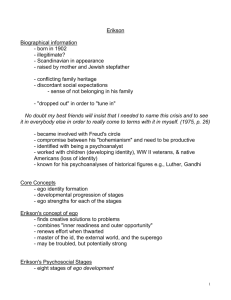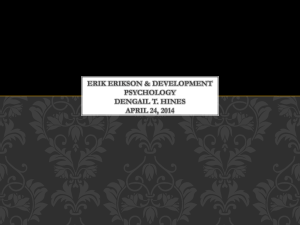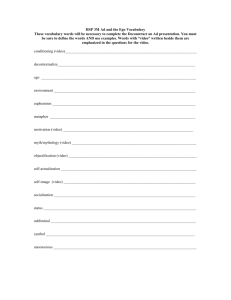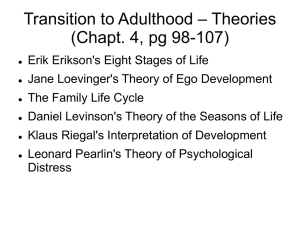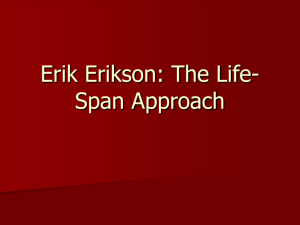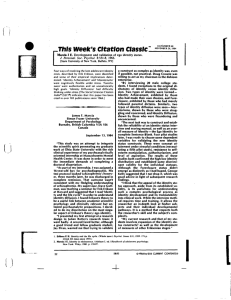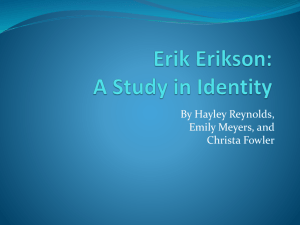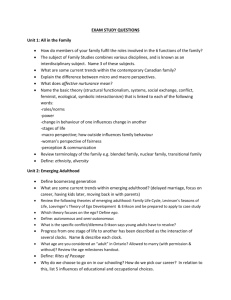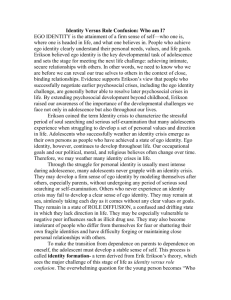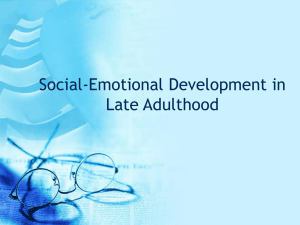Erikson's Stages - Teddie Joe Snodgrass
advertisement
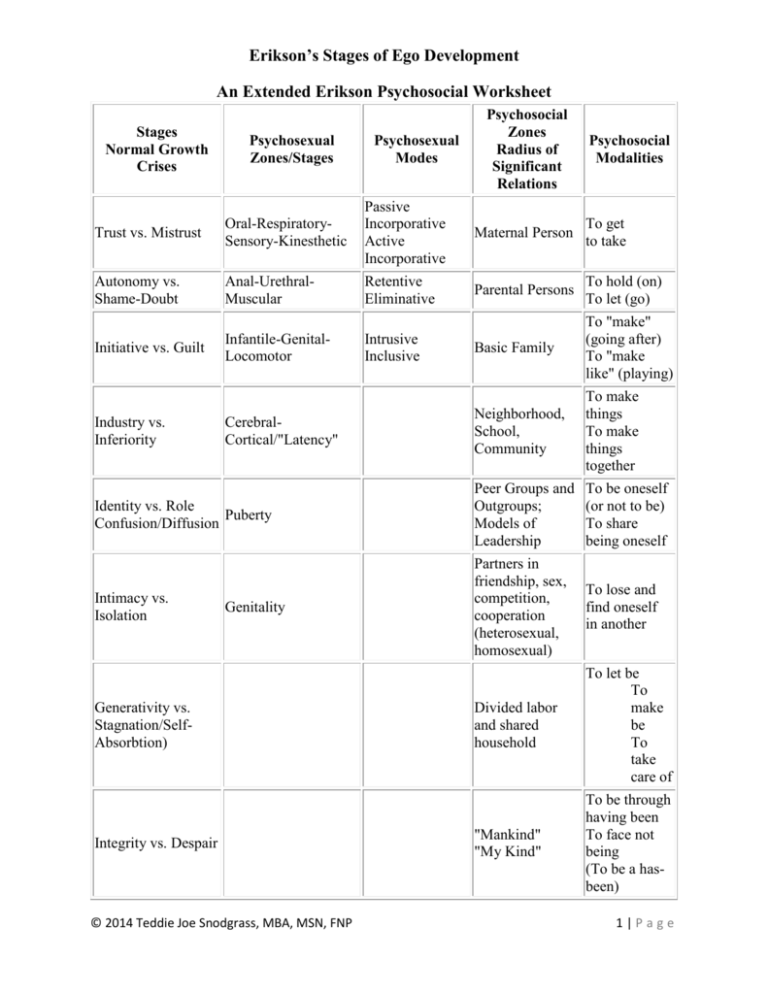
Erikson’s Stages of Ego Development An Extended Erikson Psychosocial Worksheet Stages Normal Growth Crises Psychosexual Zones/Stages Psychosexual Modes Psychosocial Zones Radius of Significant Relations Psychosocial Modalities Trust vs. Mistrust Oral-RespiratorySensory-Kinesthetic Passive Incorporative Active Incorporative Maternal Person To get to take Autonomy vs. Shame-Doubt Anal-UrethralMuscular Retentive Eliminative Parental Persons To hold (on) To let (go) Initiative vs. Guilt Infantile-GenitalLocomotor Intrusive Inclusive Basic Family To "make" (going after) To "make like" (playing) Neighborhood, School, Community To make things To make things together Identity vs. Role Puberty Confusion/Diffusion Peer Groups and Outgroups; Models of Leadership To be oneself (or not to be) To share being oneself Intimacy vs. Isolation Partners in friendship, sex, competition, cooperation (heterosexual, homosexual) To lose and find oneself in another Divided labor and shared household To let be To make be To take care of "Mankind" "My Kind" To be through having been To face not being (To be a hasbeen) Industry vs. Inferiority CerebralCortical/"Latency" Genitality Generativity vs. Stagnation/SelfAbsorbtion) Integrity vs. Despair © 2014 Teddie Joe Snodgrass, MBA, MSN, FNP 1|Page Erikson’s Stages of Ego Development Stage 1 - Basic Trust vs. Mistrust Developing trust is the first task of the ego, and it is never complete. The child will let mother out of sight without anxiety and rage because she has become an inner certainty as well as an outer predictability. The balance of trust with mistrust depends largely on the quality of maternal relationship. Stage 2 - Autonomy vs. Shame and Doubt If denied autonomy, the child will turn against him/herself urges to manipulate and discriminate. Shame develops with the child's self-consciousness. Doubt has to do with having a front and back -- a "behind" subject to its own rules. Left over doubt may become paranoia. The sense of autonomy fostered in the child and modified as life progresses serves the preservation in economic and political life of a sense of justice. Stage 3 - Initiative vs. Guilt Initiative adds to autonomy the quality of undertaking, planning, and attacking a task for the sake of being active and on the move. The child feels guilt over the goals contemplated and the acts initiated in exuberant enjoyment of new locomoter and mental powers. The castration complex occuring in this stage is due to the child's erotic fantasies. A residual conflict over initiative may be expressed as hysterical denial, which may cause the repression of the wish or the abrogation of the child's ego: paralysis and inhibition, or overcompensation and showing off. The Oedipal stage results not only in oppressive establishment of a moral sense restricting the horizon of the permissible, but also sets the direction towards the possible and the tangible which permits dreams of early childhood to be attached to goals of an active adult life. After Stage 3, one may use the whole repetoire of previous modalities, modes, and zones for industrious, identity-maintaining, intimate, legacy-producing, dispair-countering purposes. Stage 4 - Industry vs. Inferiority To bring a productive situation to completion is an aim which gradually supersedes the whims and wishes of play. The fundamentals of technology are developed To lose the hope of such "industrious" association may pull the child back to the more isolated, less conscious familial rivalry of the Oedipal time The child can become a conformist and thoughtless slave whom others exploit. © 2014 Teddie Joe Snodgrass, MBA, MSN, FNP 2|Page Erikson’s Stages of Ego Development Stage 5 - Identity vs. Role Confusion (or "Diffusion") The adolescent is newly concerned with how they appear to others. Ego identity is the accrued confidence that the inner sameness and continuity prepared in the past are matched by the sameness and continuity of one's meaning for others, as evidenced in the promise of a career. The inability to settle on a school or occupational identity is disturbing. Stage 6 - Intimacy vs. Isolation Body and ego must be masters of organ modes and of the other nuclear conflicts in order to face the fear of ego loss in situations which call for self-abandon. The avoidance of these experiences leads to isolation and self-absorption. The counterpart of intimacy is distantiation, which is the readiness to isolate and destroy forces and people whose essence seems dangerous to one's own. Now true genitality can fully develop. The danger at this stage is isolation which can lead to sever character problems. Erikson's listed criteria for "genital utopia" illustrate his insistence on the role of many modes and modalities in harmony: mutuality of orgasm with a loved partner of opposite sex with whom one is willing and able to share a trust, and with whom one is willing and able to regulate the cycles of work, procreation, and recreation so as to secure to the offspring all the stages of satisfactory development Stage 7 - Generativity vs. Stagnation Generativity is the concern in establishing and guiding the next generation. Simply having or wanting children doesn't achieve generativity. Socially-valued work and disciples are also expressions of generativity. Stage 8 - Ego Integrity vs. Despair Ego integrity is the ego's accumulated assurance of its capacity for order and meaning. Despair is signified by a fear of one's own death, as well as the loss of self-sufficiency, and of loved partners and friends. Healthy children, Erikson tells us, won't fear life if their elders have integrity enough not to fear death. © 2014 Teddie Joe Snodgrass, MBA, MSN, FNP 3|Page Erikson’s Stages of Ego Development Personality Stage Psychosexual Mode Psychosocial Modality "Virtue" Trust vs. Mistrust incorporative1 incorporative2 getting taking Hope Autonomy vs. Shame, Doubt retentive eliminative holding on letting go Willpower Inititative vs. Guilt intrusive making Purpose Industry vs. Inferiority Competence Identity vs. Role Confusion Fidelity Intimacy vs. Isolation Love Generativity vs. Stagnation Care Integrity vs.Despair Wisdom © 2014 Teddie Joe Snodgrass, MBA, MSN, FNP 4|Page
